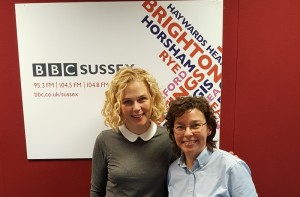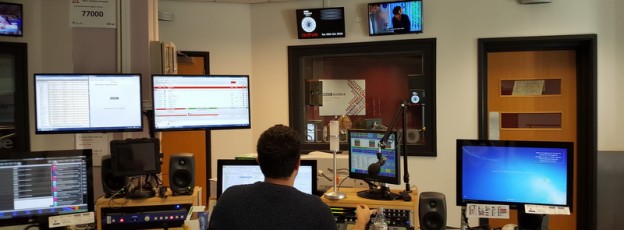Problems sleeping and insomnia are incredibly common. Knowing more and what you can do, can make a difference. You can hear my BBC Sussex Radio interview with Marcella Whittingdale and read about it here.
BBC Radio Sussex Talking About Sleep Problems
 I enjoyed being back in Brighton at the BBC Sussex studios, it is always lovely meeting the different presenters. And with Allison Ferns on holiday, it was great to meet Marcella to talk about this topic in the Sound Advice spot.
I enjoyed being back in Brighton at the BBC Sussex studios, it is always lovely meeting the different presenters. And with Allison Ferns on holiday, it was great to meet Marcella to talk about this topic in the Sound Advice spot.
Insomnia and sleep problems are something I see a lot of in practice. It can range from a temporary blip to a chronic issue. There are so many different reasons that this can happen. For some it may be that their sleep patterns have become disrupted from working shifts, caring for children or family members, or disturbances like noise.
Sometimes people may have a physical health issue such as pain that impacts upon their sleep. Women may struggle with night sweats at menopause and that can disrupt their sleep. Anxiety and stress can also affect our sleep. And it is not just children who can suffer from nightmares, I have worked with adults whose sleep has suffered from having disturbing and disruptive dreams.
Sleep problems can have a huge impact on how we feel and function, and on our energy levels and health. So it is really important to find ways of improving your sleep that work for you.
Just to highlight that as with any area of your health, if you are worried or don’t know why something has changed, it is important to get checked by your GP. A good example of this would be for sleep apnoea which is when our breathing is interrupted during sleep. This has short and longer term health implications and your GP can help assess you and may refer you to a sleep clinic if they think that would be helpful.
There are ways you can help yourself and hypnotherapy can also offer support if needed.
My Top Self-Help Tip for Insomnia and Sleep Problems
Relaxation is the gateway to better sleep, better health and better memory. Basically better everything! My favourite life hack is Box Breathing. It is so simple and quick to learn and really can help.
 Put simply it allows you to activate the part of your nervous system that creates calm, and takes you out of the stress loop. You can use it to help get into a better zone to sleep, to help with stress and anxiety, think more clearly and more. If you are struggling with sleep and are anxious and/or stressed, I recommend doing this hourly in the daytime to begin with. And practising it at night too if you wake up or are struggling to sleep.
Put simply it allows you to activate the part of your nervous system that creates calm, and takes you out of the stress loop. You can use it to help get into a better zone to sleep, to help with stress and anxiety, think more clearly and more. If you are struggling with sleep and are anxious and/or stressed, I recommend doing this hourly in the daytime to begin with. And practising it at night too if you wake up or are struggling to sleep.
It is almost like training a muscle. The more you practice this, the chances are you will find it easier to switch into a more relaxed mode in general. And that creates a great platform for so much else.
Checklist for Self-Help Tips to Help with Sleep
There are some key areas that can also have a big impact on sleep and it can be worth checking if you can make any adjustments to help improve your sleep.
- How old is your bed? Is it still comfortable and right for you now?
- How’s your bedroom set up? Set it up as a place to feel relaxed and to sleep!
- Don’t overheat – 17-18°C (63-64°F): Being too warm can get in the way of good sleep.
- Relax before bed: Enjoy some quiet time to give your body and mind a chance to wind down.
- Avoid the Blue Light from devices: This can trick the brain into thinking it is daytime. Issues around blue light are worth looking into. If you do use tablets, etc. at bedtime you can buy blue light filters to stick over your screen. I use one made by Retina Guard for my laptop and have been impressed. I believe some operating systems also have settings you can adjust to help with this too.

- Avoid caffeine and if you have to have a coffee, ideally none after 1pm, or earlier if you are sensitive.
- Alcohol has a sedating effect but doesn’t help us sleep well. It can affect REM sleep which is important for our memory functioning and creativity.
- Eating healthily and exercise/activity where possible can help too. Check your blood sugar is not dipping too much overnight. If you think that might be the case try having a small snack that is alright for you before bed, such as a banana, yogurt or oatcakes.
- If you do wake up thinking about things – have a notepad and write a note so you can let it go till morning. And don’t look at the clock!
- If you are struggling to sleep – get out of bed, do something calming. Only go back when sleepy so you have a better chance of going to sleep. The more we associate being in bed with sleep, the better chance we have of sleeping once there.
Hypnotherapy for Sleep Problems and Insomnia
 If you have tried everything and drunk enough Chamomile tea to sink a battleship then don’t despair. There are two reasons why hypnotherapy might be able to help.
If you have tried everything and drunk enough Chamomile tea to sink a battleship then don’t despair. There are two reasons why hypnotherapy might be able to help.
Firstly the process of having hypnotherapy follows similar brainwave patterns to us going to sleep. So in effect we are training the brain for sleep! Sometimes when people come for hypnotherapy they find it so relaxing they fall asleep or drift into a place where it would be easy to go to sleep. Even when they have not come for help with their sleep!
And secondly, we can work with issues that are getting in the way of good sleep. These may be around stress or anxiety, cooling down at menopause, helping with pain management, or resetting and updating high-jacked sleep patterns. It really depends upon what would help the individual.
I often make music-backed recordings for the people I work with so they can use them in-between sessions. You can read more about hypnotherapy for insomnia and please do contact me with any questions you might have.
Learning Self-Hypnosis for Help with Sleep Problems
Most people don’t realise that almost anyone can learn this useful and versatile life tool. I teach it in one-day self-hypnosis workshops. It can be a great resource to help with improving your sleep. And once you know how to use it, you can apply it to almost any area of your life or health.
Thank You BBC Radio Sussex
 It was lovely to meet Marcella and also Ollie, producer for the Allison Ferns Afternoon Show. As well as Sarah in her front of house role that day. It is a lovely team and a great local resource. I very much hope that it was helpful for all the BBC Sussex listeners who have problems sleeping. And if you would like to know more about hypnotherapy or self-hypnosis for help with sleep please do contact me – thank you.
It was lovely to meet Marcella and also Ollie, producer for the Allison Ferns Afternoon Show. As well as Sarah in her front of house role that day. It is a lovely team and a great local resource. I very much hope that it was helpful for all the BBC Sussex listeners who have problems sleeping. And if you would like to know more about hypnotherapy or self-hypnosis for help with sleep please do contact me – thank you.
You can listen again here:

